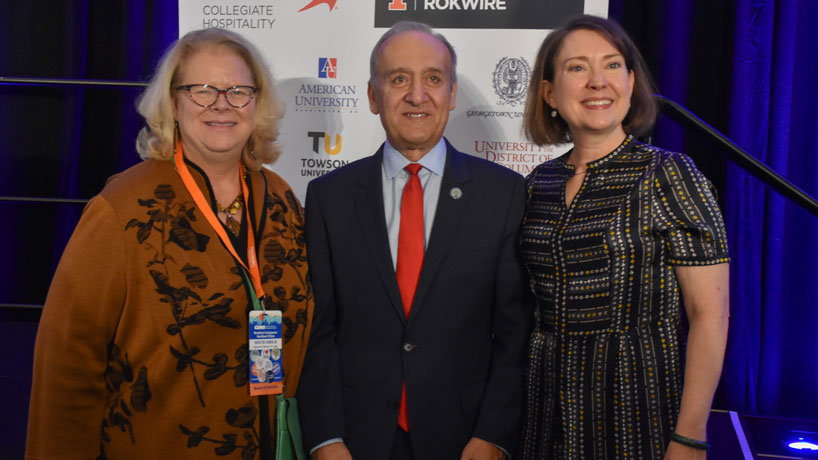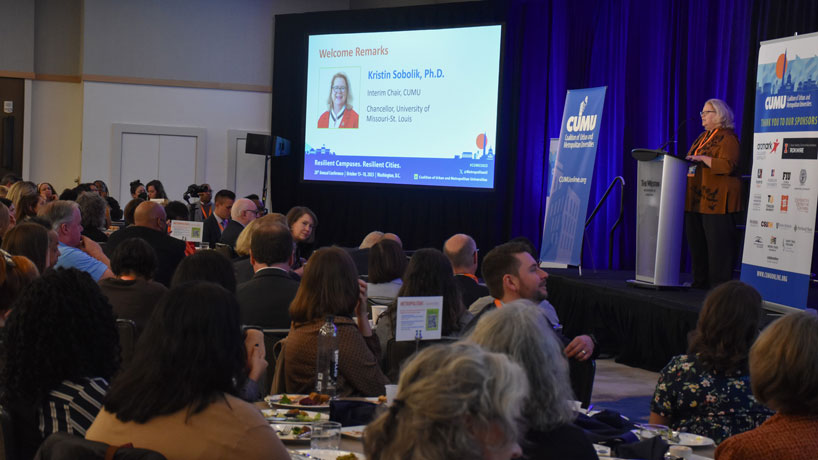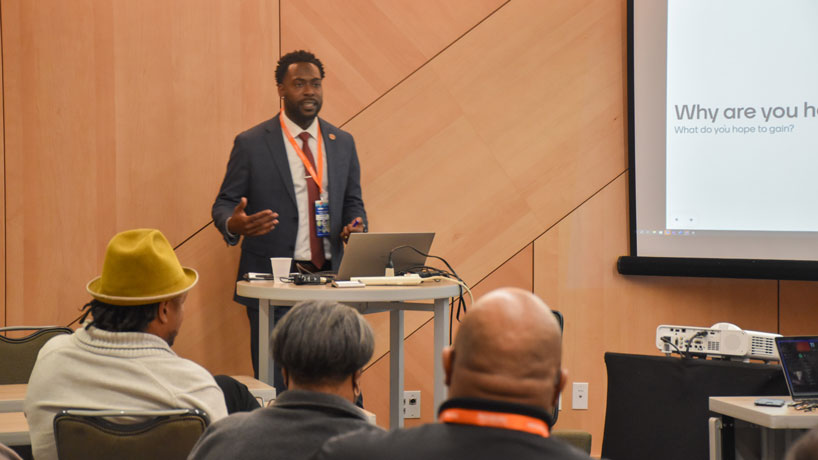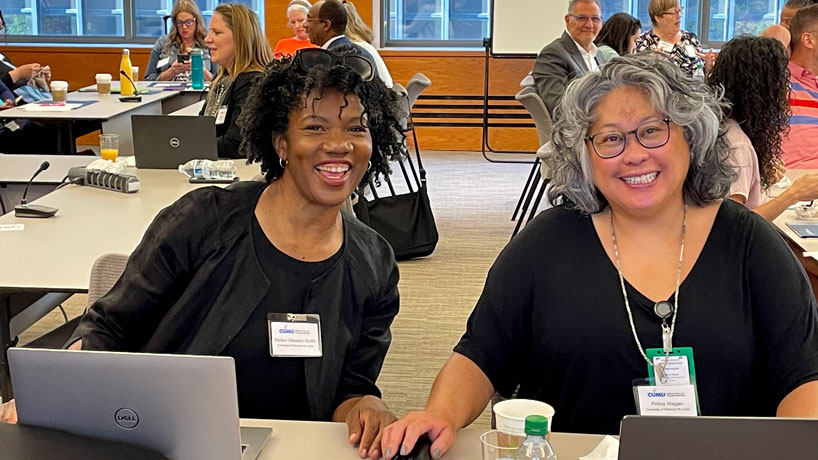
Chancellor Kristin Sobolik (at left) joined Nassar Payder, the assistant secretary for postsecondary education at the U.S. Department of Education, and Coalition of Urban and Metropolitan Universities Executive Director Valerie Holton in kicking off CUMU’s annual conference last month in Washington, D.C. Sobolik was unanimously elected chair of CUMU’s board of directors during the conference. (Photos courtesy of CUMU)
University of Missouri–St. Louis Chancellor Kristin Sobolik is set to begin a two-year term as chair of the board of directors for the Coalition of Urban and Metropolitan Universities.
Sobolik was elected to the post after winning a unanimous vote of presidents and chancellors representing CUMU’s more than 120 member institutions held in mid-October at the 28th annual conference in Washington, D.C.
“We are so pleased to welcome Chancellor Sobolik as chair of the Coalition of Urban and Metropolitan Universities Board of Directors,” CUMU Executive Director Valerie Holton said. “Dr. Sobolik is a nationally respected advocate and thought leader for higher education institutions and their role in anchoring and energizing urban and metropolitan communities. I know that both her and the University of Missouri-St. Louis’ longtime commitment to CUMU will continue to advance our more than 120 member institutions throughout the nation and world.”
Chancellor Kristin Sobolik delivers welcoming remarks at the start of the Coalition of Urban and Metropolitan Universities annual conference last month in Washington, D.C.
Sobolik’s election comes at a point when higher educational institutions are being called upon to demonstrate their importance to the wider community.
“I am really excited to serve as chair of the board of CUMU at this particular point in time,” Sobolik said. “As our society is questioning the value of higher education, it’s really important for us to work together to get that important message out about our relevancy, and it’s not just our message, it’s our actions. The CUMU institutions are exceedingly action-oriented in their communities. Therefore, people can see that value proposition each and every day. That’s exciting.”
Sobolik, who was appointed the eighth chancellor in UMSL’s history in April 2020 after previously serving as executive vice chancellor for academic affairs and provost, has embraced the important role that urban and metropolitan universities play since her days as dean of the College of Liberal Arts at Wright State University in Dayton, Ohio.
Like UMSL, Wright State was a founding member of CUMU and, in fact, hosted the organization’s first conference in 1989.
Myron Burr, UMSL’s program manager for strategic initiatives, led a mini workshop at last month’s CUMU conference.
“I’ve really valued our relationship with CUMU, no matter what institution I’ve been at, because I believe the institutions that are members of CUMU are literally the future of higher education,” Sobolik said. “They are on the ground and educationally relevant and engaged in their cities and their metropolitan regions. Those are the economic drivers of our country, and that’s the future, frankly, of our nation. Sogoes CUMU and CUMU institutions, so goes the future of our nation.”
Chancellor Emerita Blanche M. Touhill was acting chancellor when UMSL signed onto the original Declaration of Metropolitan Universities, formalizing CUMU as an organization, and the university has remained an active member.
Chancellor Emeritus Tom George also served on the board of directors during his tenure at UMSL and was president between 2017 and 2019.
Sobolik values UMSL’s participation in CUMU as a chance to showcase the work it does as an anchor institution in St. Louis – including through leadership of the St. Louis Anchor Action Network – as well as a chance to learn from others.
St. Louis Anchor Action Network Director Stefani Weeden Smith and Prima Wagan, the senior manager of economic development projects in the Office of Research and Economic and Community Development, were two members of the UMSL contingent who attended last month’s CUMU annual conference.
“It’s been really important for us to maintain our engagement within CUMU, not just at the conference,” Sobolik said, “but to really engage with the other leaders, the people who are on the ground in their other metros across the nation so that we can align and learn from each other on the best practices, on what has worked within different city situations and what work we need to do together.”
Three UMSL staff members were involved in presentations during last month’s CUMU conference in Washington, D.C.
Stefani Weeden-Smith, the director of the St. Louis Anchor Action Network, and postdoctoral fellow Ifeanyi Ukpabi joined Rita McMillan, a human resources consultant at Saint Louis University, in a panel presentation about the St. Louis Anchor Action Network and the triumphs and challenges they’ve encountered while working to increase hiring in disinvested communities. That has been a central part of the network’s mission since it launched in 2021 with an effort to increase inclusive economic growth in a focused geography of 22 ZIP codes, primarily in north St. Louis city and north St. Louis County, that have faced decades of disinvestment.
Myron Burr, UMSL’s program manager for strategic initiatives, meanwhile, led a mini workshop emphasizing active and engaged learning with facilitated discussions and an intergroup focus. It examined the organizational structures and social foundations of higher education and provided a plan of action for enacting change on campus and in the community.

















